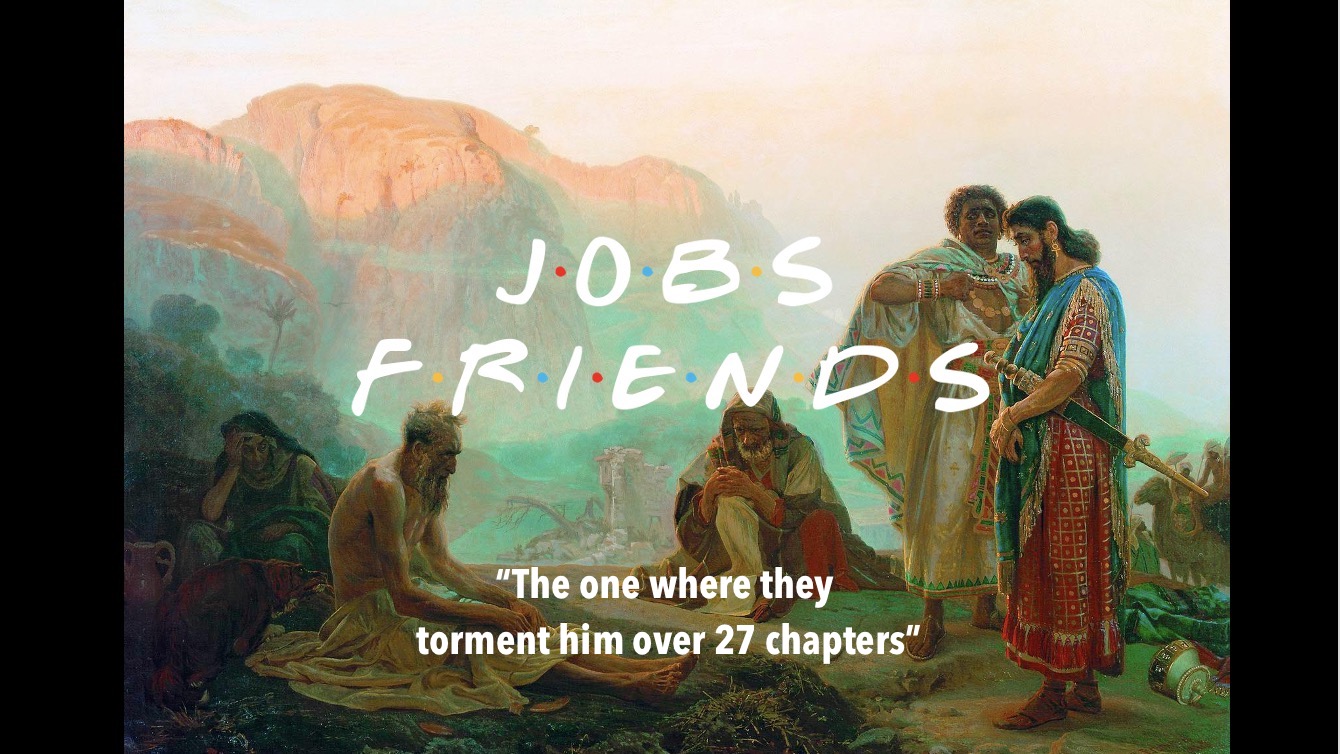Last month, about 1 million Kiwis tuned in to watch the Friends reunion (myself included). One thing I learned from watching it (besides how quickly celebrities age!) is how this 90’s sitcom about 20-somethings in New York is still a global phenomenon, through endless reruns and Netflix, and translations into dozens of languages. In one scene, Korean pop stars BTS shared how they learned English and how to do relationships through watching episodes of Friends.
And it’s not just English and relationships – like it or loathe it, this is a show that’s catechised (i.e. taught) whole generations all kinds of things:
- how not to move a couch up the stairs (helpful)
- how to use a fatsuit as a running gag to fatshame millions (still hurtful)
- how not to spell the days of the week (helpful)
- how to normalise casual sex, porn marathons and more with a laugh track (devastating)
Jonathon von Maren (who’s detailed much more of the dark enduring legacy of this show) notes: “TV is frequently a feedback loop that not only reflects culture but also drives, shapes, and informs it.”
So whether it’s Friends on TV, or friends in real life, we need wisdom to sift through what we learn from them: what’s helpful, what’s hurtful.
The names Eliphaz, Bildad and Zophar don’t have quite the same star power as Joey, Chandler and Ross. But what both sets of friends have in common is that there’s a bit of unlearning we have to do from them if we’re going to live wisely. The counsel we read from Eliphaz, Bildad and Zophar in Job 4-31 may sound grand, knowledgable and pious. But there are some fatal flaws within it. If we want to get through suffering well, we’ll have to unlearn some bad “Friends” theology, and replace it with true wisdom.
Here’s three ideas we should unlearn from Job’s friends (I’m grateful for Christopher Ash who first summarised these):
False idea #1: There is no satan behind suffering
Job’s friends speak of God a lot – but they actually never mention the Accuser (“the Satan” in Hebrew). To Job’s friends, all evil comes from humans behaving badly. That’s why they’re so quick to accuse Job of sin – if there is evil, they must find a human cause.
Yet the narrator in chapter 1-2 is clear: Job’s suffering is part of an unseen, cosmic battle. There is an Accuser (literally, “the satan” in Hebrew). And even Job hints at this: throughout his long replies, he namedrops creatures like Leviathan (Job 3:8) and Rahab (Job 26:12) – ancient beasts that symbolised chaos and evil. Deep in Job’s worldview, there is a spiritual battle between good and evil.
There is a danger of over-reading, and blaming everything on the devil. But to be a Christian is to believe evil is not just a human construct, but has a spiritual dimension. We are wrestling against more than flesh and blood (Eph 6:12).
So as we bind up real wounds, we offer to pray. As we stand with real suffering, we plead for God’s empowering Spirit. That’s one way not to fall into the error of Job’s friends.
False idea #2: There is no final judgement
The second idea we need to unlearn from Job’s friends is that “there is no final judgement”. You see, over 9 chapters Job’s friends talk as if judgement is here and now. The wicked are punished in this life. The righteous are blessed now. That’s why they’re so hard on Job. To them, God is a vending machine, or an Uber Eats driver. Press the button, out comes blessing or cursing. There is no waiting. Life is just here and now. This is the secular view of the world.
And if we’re honest, most of us live each day like functional atheists. We make life choices, career decisions, budgets as if there is no life after death. We listen more to friends who do not store treasures in heaven. Our “Job’s friends” may not give lengthy Hebrew poetry. But they love to clickbait us, or sing into our headphones, or tag us in another wise “meme” about here and now. “Max out your mortgage now.” “Buy another toy now.” “Sleep with your boyfriend now.”
But in the real world – God’s world – blessings don’t always come straight away. Yes – the Bible teaches that we will reap what we sow (Gal 6:7-10) – but it is “at the proper time” that “we will reap a harvest, if we don’t give up.”
And in the real world – God’s world – judgement delayed is not judgement denied. Every unrepentant mass murderer, child abuser, heresy-teaching pastor, will be punished. But not always here and now. Think of Jesus’s parable, how the wheat and the weeds grow beside one another (Mt 13:24-30), and they are not separated until the harvest – the final judgement. There is a day coming. And we should listen instead to Job:
“Though he slay me, yet will I hope in him,
Job 13:15
I will surely defend my ways to his face.”
“I know that my redeemer lives,
Job 19:25-26
And that in the end he will stand on the earth.
And after my skin has been destroyed,
Yet in my flesh I shall see God.”
And if Job is clinging to a final judgement of some kind, so should we.
False idea #3: There is no innocent suffering
The final idea we must unlearn from Job’s friends is that there is no such thing as innocent suffering.
In their neat and tidy world, only the wicked perish. Only the good prosper. They cannot stand Job maintaining he is righteous, because if the righteous suffer, their moral world falls apart like a house of cards. Eliphaz said it best in Job 4:7: “Consider now: Who, being innocent, has ever perished?”
To that question, the Bible’s final answer is clear:
✞
You see, Job couldn’t have known it at the time. But his innocent sufferings showed God’s wisdom far more deeply than he or his friends could ever state in words. On the cross, Jesus, being innocent, perished for the guilty. Falsely accused by a bunch of “wise guys”. Abandoned by friends. Tormented, stripped naked, abused, murdered. He perished, so we might not perish.
And if we can unlearn the “wisdom” of Job’s friends, we’ll see more clearly these deep truths from the heart of the universe: there is a place for innocent suffering. There is a spiritual battle. There is a final judgement. And there is a true Friend, who would willingly lay down His life for His friends (John 15:13).
(These thoughts are adapted from a sermon I preached on Job 4-31. You can check it out below or on Spotify, Apple podcasts and Soundcloud.)




